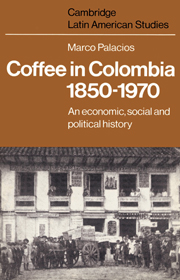Book contents
- Frontmatter
- Contents
- List of tables
- List of figures
- List of maps
- Preface
- Acknowledgements
- 1 The Colombian export economy in the second half of the nineteenth century
- 2 The making of an oligarchy
- 3 Land and society in central Colombia in the second half of the nineteenth century
- 4 The internal structure of the coffee haciendas, 1870–1930
- 5 Living conditions and internal contradictions in the hacienda structure
- 6 Inflation, devaluation, and export taxes, 1870–1904
- 7 Crisis and transition towards the second cycle of expansion, 1903–10
- 8 Private appropriation of public lands in the west
- 9 Sociopolitical elements in antioquen̄o colonization
- 10 Coffee expansion and the strengthening of the Liberal model of development, 1910–50
- 11 The international cycle and coffee policies confronting the peasant, 1930–70
- Appendix 1 Sample of coffee estates in Cundinamarca and Antioquia, 1870–98
- Appendix 2 Piece-rate wages on two coffee haciendas, 1879–1933
- Appendix 3 Concentration of the coffee export trade (percentage controlled by 20 leading companies), 1933–70
- Appendix 4 Foreign exchange rates in Colombia, 1870–1970
- Weights and measures
- Glossary
- Notes
- Biblography
- Index
- CAMBRIDGE LATIN AMERICAN STUDIES
6 - Inflation, devaluation, and export taxes, 1870–1904
Published online by Cambridge University Press: 06 October 2009
- Frontmatter
- Contents
- List of tables
- List of figures
- List of maps
- Preface
- Acknowledgements
- 1 The Colombian export economy in the second half of the nineteenth century
- 2 The making of an oligarchy
- 3 Land and society in central Colombia in the second half of the nineteenth century
- 4 The internal structure of the coffee haciendas, 1870–1930
- 5 Living conditions and internal contradictions in the hacienda structure
- 6 Inflation, devaluation, and export taxes, 1870–1904
- 7 Crisis and transition towards the second cycle of expansion, 1903–10
- 8 Private appropriation of public lands in the west
- 9 Sociopolitical elements in antioquen̄o colonization
- 10 Coffee expansion and the strengthening of the Liberal model of development, 1910–50
- 11 The international cycle and coffee policies confronting the peasant, 1930–70
- Appendix 1 Sample of coffee estates in Cundinamarca and Antioquia, 1870–98
- Appendix 2 Piece-rate wages on two coffee haciendas, 1879–1933
- Appendix 3 Concentration of the coffee export trade (percentage controlled by 20 leading companies), 1933–70
- Appendix 4 Foreign exchange rates in Colombia, 1870–1970
- Weights and measures
- Glossary
- Notes
- Biblography
- Index
- CAMBRIDGE LATIN AMERICAN STUDIES
Summary
Most Colombian historians agree that between 1880 and 1886 changes in economic policy and in the constitution bring the Radical period to an end. Monetary policies – the creation of the national bank, the ending of the right of the commercial banks to issue currency, and finally the imposition of the curso forzoso (the forced acceptance of paper money) – are seen by these historians as mechanisms for redirecting investment towards production, reviving the economy, and promoting coffee exports. Political centralism and the new extended Presidential powers and term are seen as essential to national unity, gravely threatened by the federalist anarchy of the free-trade era.
I do not intend to give a full account of all these complexities, crucial as their interaction was in the formation of the contemporary Colombian state and in maintaining its legitimacy. I must concentrate on one part of the Regeneration's economic ‘programme’ and its impact specifically on the expansion of coffee.
I hope to show that economic policy did not have as its objective promoting coffee exports or channelling savings to investment in coffee. Nor did it have a long-term coincidental effect of encouraging the sector, and it is therefore not possible to attribute to it a positive role in the first cycle of expansion. In this chapter I shall show that the opposition to the new policies that came from bankers, importers, and exporters was not derived just from their being now relatively isolated from political power, whereas they had previously been the beneficiaries of official favour. This opposition was much more widely based, and it went far beyond what one would expect if it were just a matter of the mere immediate economic interests of these groups.
- Type
- Chapter
- Information
- Coffee in Colombia, 1850–1970An Economic, Social and Political History, pp. 121 - 140Publisher: Cambridge University PressPrint publication year: 1980

